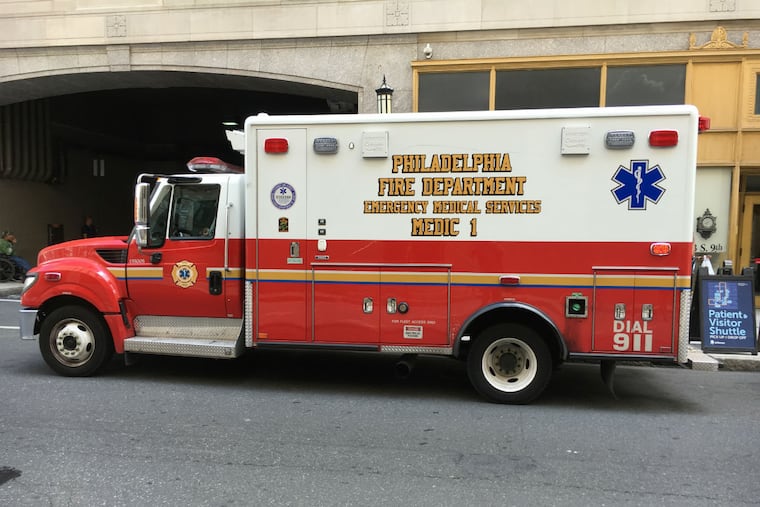
If you have never dialed 911 for an ambulance - and most of us haven't - you probably don't know that after the professional paramedics have taken you to the hospital, the city will send you a bill.
A really big bill.
It came as a shock to Roberto Roque, 56, who suffered a severe asthma attack four years ago while at the Asthma Center, 822 Pine St., across from Pennsylvania Hospital.
Rather than risk liability by walking him across the street, the doctor called 911 to collect Roque and "drive around the block," Roque says.
A few days later, a bill arrived at his Pennsport home for about $1,100.
"I was shocked, totally shocked. 'You've got to be kidding me, this is a ridiculous amount,' " he says he thought.
"We fought the charge and lost, so we had to pay," says Roque.
Same for Center City lawyer Lionel Artom-Ginzburg, 44, who was visiting his parents at 17th and Spruce about 20 years ago when an abdominal vessel burst.
His parents called 911 and he was rushed to Pennsylvania Hospital, where he wound up in the ICU.
"A couple of weeks later, I get a bill for $400," says the Southwest Center City resident, adding that he knows the charges have gone up since then. He was shocked, but "turned it over to Blue Cross," he says. He was shocked again to find that it wasn't covered.
Artom-Ginzburg is right about the fees having gone up.
These are the current fees, according to the Philadelphia Fire Department: basic life support, $950; advanced life support, $1,050; mileage, $10 per mile; oxygen, $40; EKG, $80; diabetic (treatment, not transport), $50.
The figures were provided by spokesman Capt. William Dixon, who did not tell me when fees were first levied, but did say that "the cost for emergency medical service and ambulance transportation is covered by health care insurance companies."
Except not all health insurers cover ambulance transportation, and not everyone has health insurance. I asked Dixon for a reaction to that by email and received no reply.
Philadelphia is not alone in charging for this service. Other big cities do it. In smaller cities and towns, volunteer fire departments charge annual membership fees or charge non-members for an ambulance run.
In Philadelphia, the charges mask an underlying question: Why are patients being charged at all?
If your house is on fire and the Fire Department arrives and puts out the fire, there is no charge. If there's a burglary and the cops arrive to investigate, there's no charge.
So why should there be a charge when the Fire Department handles a health emergency?
The only answer I could get from Dixon was this: "The new administration is reviewing all policies and procedures pertaining to past and present practices."
The practice of charging patients began in 1988, according to stories in the Inquirer and Daily News. The fees were instituted by then-Fire Commissioner William Richmond to help defray what was then a service costing the department about $13 million annually, he said, adding that he hoped the fees would discourage some people from using fire rescue as a taxi service, which some do.
The right thing would have been to get more funding from the city rather than charge patients for the service.
For Philadelphians who pay wage and income taxes, it seems like gouging, being charged twice. One of the justifications for taxing the wages of nonresidents is to help pay for city services they consume, such as streets, police, and fire.
As far as I can tell, announcement of the fees brought very little outcry from the public - this was before social media - probably because few thought they would ever need the service. Others may have thought their insurance covered it.
Nobody said boo.
Steve Hess, 61 and now retired, was a firefighter when the fees were initiated. "The city found out they could charge the insurance companies and for welfare people, the federal government," he says. When he was working as a paramedic and handled people without insurance, he admits to screwing up the paperwork so they wouldn't get billed.
Even when the bills are done right, the city collects less than 20 percent of what it charges, according to a 2012 analysis of collection fees by City Controller Alan Butkovitz. Of $179.7 million charged for ambulance runs in fiscal year 2011, only $34 million was collected.
Some of this is explained by low reimbursement fees, incomplete or inaccurate billing, the controller said, or people unable or unwilling to pay.
Such as freelance writer Brett Harrison, 56, who called 911 for an ambulance in 2012 because of a severe pain in his leg.
The University City resident was "very shocked" when he got a $1,000 bill for transport to nearby Presbyterian Hospital. He couldn't afford to pay, and didn't.
If you are a city taxpayer, I don't blame you for feeling that you have already paid. You have.
If the policy is under review, as Dixon says, this is the time to get rid of it. The city should not charge sick people for a ride to the hospital.
215-854-5977 @StuBykofsky
Blog: ph.ly/Byko
Columns: ph.ly/StuBykofsky